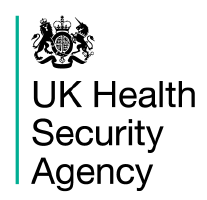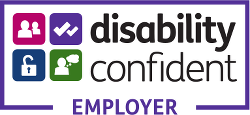Job summary
- Main area
- Health Sciences Professional
- Grade
- Civil Service: Grade 7
- Contract
- 2 years fixed term and permanent position available.
- Hours
- Full time
- Part time
- Job share
- Flexible working
- Job ref
- 919-NE-14458997-EX
- Employer
- UK Health Security Agency
- Employer type
- Public (Non NHS)
- Site
- Colindale
- Town
- London
- Salary
- £55,799 - £65,089 Per annum Pro rata
- Salary period
- Yearly
- Closing
- 22/05/2024 23:59
- Interview date
- 13/06/2024
Employer heading

Scientific Co-ordinator
Civil Service: Grade 7
Job overview
THE UK FIELD EPIDEMIOLOGY TRAINING PROGRAMME
The Field Epidemiology Training Programme (UKFETP) is a competency-based 2-year specialist postgraduate training programme aimed at medical, scientific, veterinary and nursing staff who are, or will be, working in a post involving field investigation and epidemiology and who want to further enhance their specialist skills. Training is provided on the job; at least ten percent of time is dedicated to formal training courses. Fellows are based at training locations in England, Northern Ireland and Wales and are supervised day to day by Primary Field Supervisors at these sites. Scientific support, tuition and mentoring is provided by the UKFETP scientific coordinators.
The UKFETP Office is responsible for the development, delivery and ongoing management of the UKFETP and is be based at UKHSA Colindale. The team currently consists of 1 Director, 4 Scientific Coordinators, 1 Virtual Learning Designer, 1 Business Change Manager, 1 Business Operations Manager, 1 Business Support Manager, and 4 job share Business Support Officers. We have opportunity for two Scientific coordinators to join the team on a permanent and fixed term basis.
Main duties of the job
The scientific coordinator will manage and deliver specific scientific aspects of the taught programme and provide mentorship and scientific support to the UKFETP fellows.
This will include review, evaluation and revision of the taught components of the programme as well as development of training materials and delivery of UKFETP training
The scientific coordinator will be expected to provide specialist epidemiological and pedagogical expertise to the UKFETP programme and fellows and will have the opportunity to contribute to strategic developments with UK and international partners., subject to funding.
Please read all the information on this page carefully - The main duties and responsibilities for the role are displayed below
Working for our organisation
We pride ourselves as being an employer of choice, where Everyone Matters promoting equality of opportunity to actively encourage applications from everyone, including groups currently underrepresented in our workforce. UKHSA ethos is to be an inclusive organisation for all our staff and stakeholders. To create, nurture and sustain an inclusive culture, where differences drive innovative solutions to meet the needs of our workforce and wider communities. We do this through celebrating and protecting differences by removing barriers and promoting equity and equality of opportunity for all.
Detailed job description and main responsibilities
The main duties and responsibilities are:
Teaching and Training:
- Co-ordinate, deliver and evaluate training
- Develop training materials
- Support the review of the UKFETP curriculum
- Manage programme training objectives with both training sites and fellows and ensure outputs are reviewed.
- Promote participation of UKFETP supervisors in training and oversight activities.
- Assess and promote additional training opportunities and assignments: identify UK or international investigations or research projects and negotiate the participation of UKFETP fellows.
- Monitor and promote UKFETP training site developments and disseminate information about the UKFETP programme to UKFETP training sites.
- Develop training and supervisory skills and techniques among UKFETP supervisors at training sites.
- Provide pedagogical support/tutoring to fellows by identifying training needs and aligning these to projects; reviewing protocols, reports, manuscripts, and presentations.
- Oversee programme evaluation methods and ensure they are fit for purpose; update on new methodological developments relevant to the work of the UKHSA.
- Oversee monitoring and progress of UKFETP fellows. Address any issues in progress.
- Ability to travel within the UK and overseas including overnight stays away from base for up to 2 weeks.
Management, Policy and Planning:
- To work alongside other members of the UKFETP team on:
- the business planning process and the development of the UKFETP programme and activities;
- the selection and recruitment of staff, including, short-listing applicants and interviewing candidates selected for interview;
- ongoing monitoring and quality improvement of the programme
- identifying programme risks and methods for remediation
Other:
- The above is only an outline of the tasks, responsibilities and outcomes required of the role. You will carry out any other duties as may reasonably be required by the directorate.
- The job description and person specification may be reviewed on an ongoing basis in accordance with the changing needs of the organisation.
- It should be noted that the work of the division is of a confidential nature and must not be communicated to other persons except where required for authorised purposes.
- A high commitment to confidentiality is expected, adhering to Caldicott standards and the requirements of the Data Protection and Human Rights Acts within the framework of the Freedom of Information Act.
Professional Development:
- Identify, discuss and action own professional performance and training / development needs with your line manager through appraisal / individual development plan. Attending internal / external training events
- To participate in all mandatory training as required, i.e. fire safety, information governance and all other mandatory training.
Key Working Relationships:
- The post holder will develop working relationships and communicate regularly with a wide range of individuals, clinical and non-clinical, internal and external to UKHSA. This will include;
Internal
- UKFETP team
- UKFETP fellows
- Primary field and project supervisors
- Health Protection Teams
- Field Service
- Global Public Health
- Centre for Radiation, Chemicals and Environmental Hazards
- Public Health Microbiologists
- NIS Statistics Unit
External
- Public Health Wales
- Public Health Agency of Northern Ireland
- European Centre for Disease Control (ECDC)
- Collaborating academics and scientists in Higher Education Institutions
- Other regional or national UKFETPs
- Training Programs in Epidemiology and Public Health Interventions Network (TEPHINET)
- World Health Organization
Essential criteria
Knowledge and Experience
- PhD in a relevant subject or equivalent knowledge and experience. Equivalent experience would be demonstrated by an MSc and a body of relevant publications or relevant experience.
- Experience of developing and delivering teaching/training material in advanced epidemiological methods (for example multivariable analysis, time series analysis, sampling).
- Experience of educational supervision including review of protocols, reports and abstracts.
- Experience of providing specialist senior epidemiological support and advice to colleagues and external agencies including investigation of outbreaks.
- Experience of writing and publishing scientific papers in peer-reviewed journals and/or project reports.
- Use of statistical software (e.g. R and/or STATA) and experience of statistical methods such as multivariable analysis, time-series analysis and sampling.
- Experience of presenting scientific papers at national and international conferences
Skills and Capabilities
- Excellent written and oral communication skills and an ability to develop constructive working relationships with people at all levels of seniority showing empathy, sensitivity and professionalism
- Willing to engage with and learn from peers, other professionals and colleagues in the desire to provide or support the most appropriate interventions.
- Must be able to prioritise own work effectively and be able to coordinate activities of others.
- Strategic thinking – ability to anticipate and resolve problems before they arise
Equality and Diversity
- An understanding of and commitment to equality of opportunity and good working relationships
Desirable criteria
- Postgraduate qualification in teaching, education or allied subject.
- FETP or equivalent diploma.
- Experience of researching best practice (globally, private and public sector), interpreting its relevance and processes/ practices which could be implemented successfully to achieve system reform (advising on policy implementation)
Selection process details
This vacancy will be assessed using a competency-based framework which will assess your Qualifications, knowledge and experience and / or skills and capabilities outlined in the essential criteria.
Stage 1: Application & Sift
You will be required to complete an application form. You will be assessed on the above listed (12) essential criteria, and this will be in the form of
- a CV/ Application form (‘Employer/ Activity history’ section on the application)
- a Statement of Suitability of no more than 1500 words.
This should outline how your skills, experience, and knowledge, provide evidence of your suitability for the role, with reference to the essential criteria. Please do not exceed 1500 words. We will not consider any words over and above this number.
The CV/ Application form and Statement of Suitability will be marked together.
In the event of a large number of applications we will shortlist on "Experience of developing and delivering teaching/training material in advanced epidemiological methods".
If you are successful at this stage, you will progress to interview & assessment.
Feedback will not be provided at this stage.
Stage 2: Interview
You will be invited to a (single) face to face interview. In exceptional circumstances, we may be able to offer a remote interview.
Knowledge, experience, skills & abilities will be tested at interview.
As part of interview, you will also be asked to prepare a presentation prior to the interview - further details of this will be confirmed to you nearer the time.
Interviews will be held on 13th June 2024. Please note, these dates are subject to change.
Once this job has closed, the job advert will no longer be available. You may want to save a copy for your records.
Eligibility Criteria
Open to all external applicants (anyone) from outside the Civil Service (including by definition internal applicants).
Security Clearance Level Requirement
Successful candidates must pass a disclosure and barring security check.
Successful candidates must meet the security requirements before they can be appointed. The level of security needed is Basic Personnel Security Standard.
Working for the Civil Service:
The Civil Service Code sets out the standards of behaviour expected of civil servants.
We recruit by merit on the basis of fair and open competition, as outlined in the Civil Service Commission's recruitment principles.
The Civil Service welcomes applications from people who have recently left prison or have an unspent conviction. Read more about prison leaver recruitment.
It’s important to note that there are currently exceptions to applications being considered if your conviction relates to any of the following:
- life sentences
- arson
- sexual offences
- hate and terror offences
Some departments will also consider the specific offence against the nature of the business, i.e., a conviction for fraud may rule you out for a finance role.
If you are interviewed for the post and do not meet the required threshold for the specified grade, your application may be assessed against a similar, lower grade role and you may be offered the post should one be available
Starting salary
Entrants to the Civil Service are expected to start on the minimum of the pay band.
The internal roles rules apply to existing Civil Servants, i.e. level transfers move on current salary or the pay range minimum, transfers on promotion move to new pay range minimum or receive 10% increase.
Either case is determined by whichever is the highest.
For further details please refer to the Information Sheet - Starting Salaries & Benefits attachment
Person specification
Qualifications
Essential criteria
- PhD in a relevant subject or equivalent knowledge and experience. Equivalent experience would be demonstrated by an MSc and a body of relevant publications or relevant experience.
Desirable criteria
- Postgraduate qualification in teaching, education or allied subject.
- FETP or equivalent diploma.
Knowledge and Experience
Essential criteria
- Experience of developing and delivering teaching/training material in advanced epidemiological methods (for example multivariable analysis, time series analysis, sampling).
- Experience of educational supervision including review of protocols, reports and abstracts.
- Experience of providing specialist senior epidemiological support and advice to colleagues and external agencies including investigation of outbreaks.
- Experience of writing and publishing scientific papers in peer-reviewed journals and/or project reports.
- Use of statistical software (e.g. R and/or STATA) and experience of statistical methods such as multivariable analysis, time-series analysis and sampling.
- Experience of presenting scientific papers at national and international conferences
Skills and Capabilities
Essential criteria
- Excellent written and oral communication skills and an ability to develop constructive working relationships with people at all levels of seniority showing empathy, sensitivity and professionalism
- Willing to engage with and learn from peers, other professionals and colleagues in the desire to provide or support the most appropriate interventions.
- Must be able to prioritise own work effectively and be able to coordinate activities of others.
- Strategic thinking – ability to anticipate and resolve problems before they arise
Desirable criteria
- Experience of researching best practice (globally, private and public sector), interpreting its relevance and processes/ practices which could be implemented successfully to achieve system reform (advising on policy implementation).
Equality and diversity
Essential criteria
- An understanding of and commitment to equality of opportunity and good working relationships.
Documents to download
Further details / informal visits contact
- Name
- Recruitment
- Job title
- Recruitment
- Email address
- [email protected]
List jobs with UK Health Security Agency in Administrative Services or all sectors





